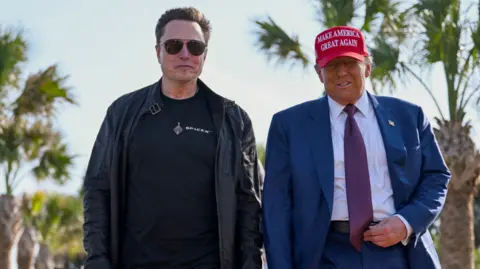How countries respond to Trump's tariffs is what matters next
 Reuters
ReutersIt was not a bluff, the tariffs are here - and this is just the opening salvo from the Oval Office.
The world trading system has not been here before. A slide towards a wider trade conflict is very much on the cards, as President Trump prepares similar tariffs firstly against Europe, and then at a lower level universally.
But what matters as much as the actions the US takes, is how the rest of the world responds.
That, in turn, requires a judgement about what the president is actually trying to achieve.
Trump regularly changes his rationale for tariffs - either to coerce diplomatic change, to deal with trade imbalances or to raise significant revenues.
These policy objectives cannot all be achieved simultaneously.
For example, learning from the experience of Trump's first term "China deal", Western diplomats have been scrambling to find lists of US goods they might buy more of, in order to give the White House some wins.
Europe could say it is increasing its purchases of US shipments of liquefied natural gas, or arms, or specialised magnets for wind farms.
It doesn't really matter if these trends were already in train, as long as the US president can be allowed to chalk up a "win".
But is changing trade deficit numbers really the aim here?
Officially, the rationale for Trump's move is punishment for the trade in the synthetic opioid fentanyl, but that is widely seen as a legal pretext for "emergency" action that would normally require a congressional decision.
Canada has signalled it will take a robust approach to Trump, best articulated by the contender to be the country's next prime minister, Mark Carney.
"We will retaliate … dollar for dollar" he told the BBC, ridiculing the fentanyl rationale and saying Canada would "stand up to a bully".
This is significant whether or not Carney succeeds Justin Trudeau and ends up chairing the G7, which is the group of the world's seven largest so-called "advanced" economies.
As a former governor of the Bank of England, Carney witnessed Trump on the world stage at G20 and G7 meetings first hand and has clearly concluded that the US leader only respects strength.
He had a coded warning for any nation seeking to stay quiet and not catch the eye of the president: "Good luck."
In recent conversations I have had with European trade negotiators, they have stressed cooperation and partnership, as well as deals with the US. When asked, they avoided directly criticising even the extraordinary suggestion of using tariffs against Nato ally Denmark over the fate of Greenland.
 Reuters
ReutersThe real question here is whether the rest of the world, even tacitly, coordinates retaliatory tariffs on, for example, high profile political supporters of President Trump, such as Elon Musk, which is a typical feature of previous smaller disputes.
Tesla, the electric vehicle maker led by Musk, last week warned on the impact of tit-for-tat tariffs.
All of this would be aimed at making the rival courts around the Oval Office, and interests in Congress, assert their concerns about the impact on US factories' global exports.
This is all before the impact on US domestic prices.
This could also come, more circuitously, through the application of a planned carbon trade tax in various jurisdictions.
Exactly how this plays out depends on perceptions of just how powerful the US remains.
Some nations may conclude that these days, there are other options in the world.
With tariffs threats being sprayed in multiple directions every day, the world is in uncharted territory.
